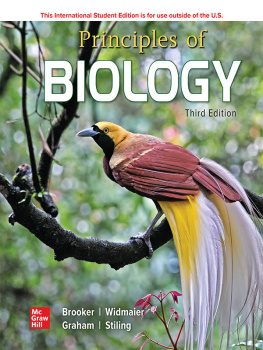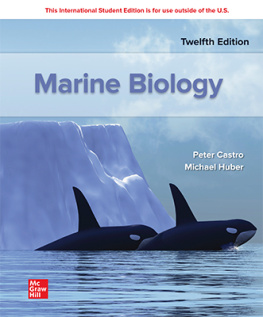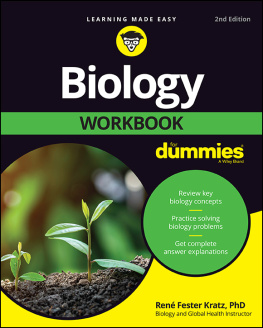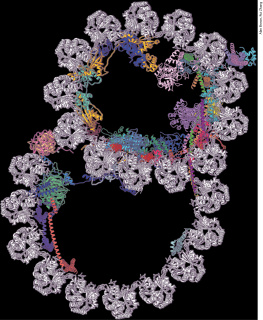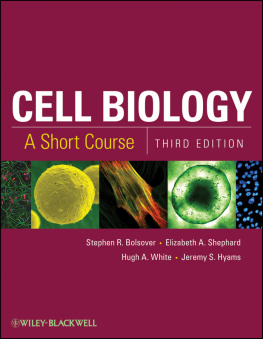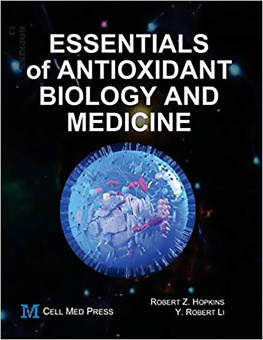Table of Contents

ii

PRINCIPLES OF BIOLOGY
Published by McGraw-Hill Education, 2 Penn Plaza, New York, NY 10121. Copyright 2021 by McGraw-Hill Education. All rights reserved. Printed in the United States of America. No part of this publication may be reproduced or distributed in any form or by any means, or stored in a database or retrieval system, without the prior written consent of McGraw-Hill Education, including, but not limited to, in any network or other electronic storage or transmission, or broadcast for distance learning.
Some ancillaries, including electronic and print components, may not be available to customers outside the United States.
This book is printed on acid-free paper.
1 2 3 4 5 6 7 8 9 LWI 24 23 22 21 20
ISBN 978-1-260-57132-5
MHID 1-260-57132-7
Cover Image: TeeJe/Getty Images
All credits appearing on page or at the end of the book are considered to be an extension of the copyright page.
The Internet addresses listed in the text were accurate at the time of publication. The inclusion of a website does not indicate an endorsement by the authors or McGraw-Hill Education, and McGraw-Hill Education does not guarantee the accuracy of the information presented at these sites.
mheducation.com/highered
iii
Brief Contents

iv
About the Authors

Left to right: Eric Widmaier, Linda Graham, Peter Stiling, and Rob Brooker
Robert J. Brooker
Rob Brooker received his Ph.D. in genetics from Yale University in 1983. At Harvard, he studied lactose permease, the product of the lacY gene of the lac operon. He continued working on transporters at the University of Minnesota, where he is a professor in the Department of Genetics, Cell Biology, and Development. At the University of Minnesota, Dr. Brooker teaches undergraduate courses in biology and genetics. In addition to many other publications, he has written two undergraduate genetics texts: Genetics: Analysis & Principles, seventh edition, copyright 2021, and Concepts of Genetics, third edition, copyright 2019; and he is the lead author of Biology, fifth edition, copyright 2020, all published by McGraw-Hill Education.
Eric P. Widmaier
Eric Widmaier received his Ph.D. in 1984 in endocrinology from the University of California at San Francisco. His research focuses on the control of body mass and metabolism in mammals, the hormonal correlates of obesity, and the effects of high-fat diets on intestinal cell function. Dr. Widmaier is currently professor emeritus of biology at Boston University, where he has taught undergraduate and graduate courses in human physiology, comparative physiology, and endocrinology and recently received the universitys highest honor for excellence in teaching. Among other publications, he is lead author of Vanders Human Physiology: The Mechanisms of Body Function, fifteenth edition, copyright 2019, and coauthor of Biology, fifth edition, copyright 2020, both published by McGraw-Hill Education.
Linda E. Graham
Linda Graham received her Ph.D. in botany from the University of Michigan, Ann Arbor, where she also did postdoctoral work. Her research explores the evolutionary origin of algae and land-adapted plants, focusing on cell and molecular biology as well as ecological interactions with microbes. Dr. Graham is currently a professor of botany at the University of WisconsinMadison. She teaches courses in microbiology and plant biology. She is the coauthor of, among other publications, Algae, third edition, copyright 2015, a textbook on algal biology; and Plant Biology, third edition, copyright 2015, both published by LJLM Press. She is also a coauthor of Biology, fifth edition, copyright 2020, published by McGraw-Hill Education.
Peter D. Stiling
Peter Stiling obtained his Ph.D. in zoology from University College, Cardiff, United Kingdom. Subsequently, he became a postdoctoral fellow at Florida State University and later spent two years as a lecturer at the University of the West Indies, Trinidad. Dr. Stiling was formerly chair of the Department of Integrative Biology at the University of South Florida (USF) at Tampa, where he is currently an assistant vice provost for strategic initiatives and professor of biology. His research interests include plant-animal relationships and invasive species. He currently teaches biology to USF students in a London summer program, which he established in 2015. Dr. Stiling was elected an AAAS Fellow in 2012. He is also the author of Ecology: Global Insights and Investigations, second edition, copyright 2015, and coauthor of Biology, fifth edition, copyright 2020, both published by McGraw-Hill Education.
v
Principles of Biology: Helping Students Learn Critical-Thinking Skills
The third edition of Principles of Biology has been crafted with a very important goal in mind: Give students an opportunity to develop critical-thinking skills. We expect that their journey through this textbook will help them to think like scientists and to develop skills that are needed in many different careers in biology.
Emphasizing Skills Development and Problem Solving
Skills! Skills! Skills! Thats what instructors want their students to develop and thats what students often find the most challenging. The pedagogical features of Principles of Biology, 3e, are aimed at achieving this goal. Much like the way that an enzyme lowers the activation energy for a chemical reaction and thereby increases its rate, the author team has developed pedagogical features that should lower the barriers that prevent skill development and thereby allow students to develop their critical-thinking skills more quickly.
New! Critical-Thinking Questions at the End of Each Chapter
In the third edition of Principles of Biology, we have completely reorganized our end-of-chapter questions and have a new category of questions called Critical-Thinking Skills. These are largely new questions that are primarily at Blooms levels 3 (applying) and 4 (analyzing).

New! Modeling Challenges
A growing trend is the use of models in biology education. Students are asked to interpret models and to create models based on data or a scenario. Furthermore, using models and simulations is one of the core skills that is emphasized by Vision and Change. The author team has added a new feature called a Modeling Challenge, which asks students to create a model or to interpret a model they are given. Possible answers to the Modeling Challenges are provided in Connect.

vi
SCISKILLS
The beginning of each section of every chapter contains a set of Learning Outcomes that inform students of concepts they should understand. Many sections contain skills-based Learning Outcomes, labeled as SCISKILLS. These Learning Outcomes are specific to the skills that students will acquire when mastering the material and provide a specific understanding of how such skills may be assessed. SCISKILLS are mental actions such as analyzing data, forming hypotheses, making predictions, or performing calculations. These are skills that scientists generally rely on and students should practice.

